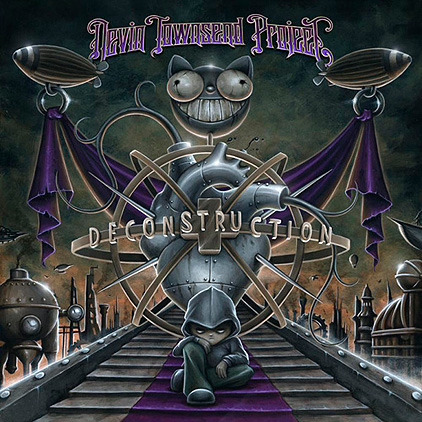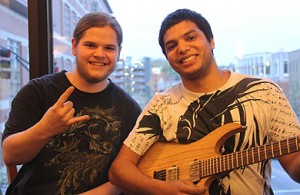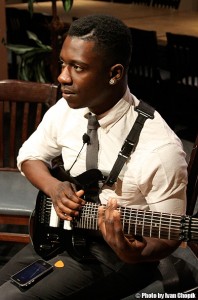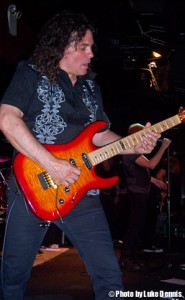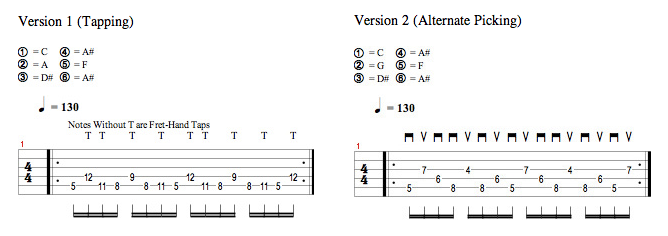 Following Devin Townsend’s career has been a diverse musical journey through the many facets of his compelling personality. First introduced to the world as Steve Vai’s lead vocalist on 1993’s Sex & Religion, Townsend quickly flexed his talents as a guitarist, songwriter, and producer with Strapping Young Lad where his darker emotions could run amok. Not content to hide his lighter side he released a slew of solo albums on his own HevyDevy records. While still toeing the blacker waters of metal, Townsend’s solo career found him submerged in more progressive tides as his complex and honest personality shined through.
Following Devin Townsend’s career has been a diverse musical journey through the many facets of his compelling personality. First introduced to the world as Steve Vai’s lead vocalist on 1993’s Sex & Religion, Townsend quickly flexed his talents as a guitarist, songwriter, and producer with Strapping Young Lad where his darker emotions could run amok. Not content to hide his lighter side he released a slew of solo albums on his own HevyDevy records. While still toeing the blacker waters of metal, Townsend’s solo career found him submerged in more progressive tides as his complex and honest personality shined through.
After disbanding Strapping Young Lad in 2007, he began work on a four-album series called the Devin Townsend Project, which resulted in a beautiful culmination of his time in the trenches of extreme music. Through his years in in SYL, his wrestling with substance abuse, and his emergence into middle aged maturity, the quadrilogy culls together the perspective and wisdom of a man ready to tell his life as testament, confession, and lesson to those who’ve followed him all these years. I had the privilege to sit down and talk with him during his North American tour and discuss his musical process and philosophies:
EB: So it’s the last day of the U.S. tour. How has it been?
DT: Good. We’re out with Children of Bodom, Obscura, and Septic Flesh. That’s typically not the scene I would have expected to find the Devin Townsend Project playing with, however we just released two records simultaneously, Deconstruction and Ghost. Deconstruction is relatively heavy in terms of it’s sound and in my opinion very heavy in terms of its content, and so I think in order to add validity to this stage of my career, it makes sense to put us out with bands that are legitimately a part of a heavier scene. We stand our ground. We definitely do what we do, no bones about it, but I think it’s been really good. I think, if for nothing else, we offer an option, right?
EB: Definitely. The music has certainly expanded over the past few albums.
DT: Yeah, none of these four records are meant to be a definition of where I am musically or even thematically at this point in my life. It’s simply meant to represent in a literal music sense how I went from being the musician I had been with Strapping Young Lad to where I will be in the future. As a result of that, the four records cover the gamut from very quiet music to very complicated music. There are some commercial things, there are some really New-Age sounding things.
But again, none of them are supposed to be a definition of who I am, but more of a statement of ‘it’s all kind of who I am.’ I just have no real fear of doing whatever I want to do at this point, be it pop music or orchestral stuff or whatever. I think the most important thing for me to say with these records is simply that if you limit yourself to any particular genre then you end up sort of fighting it when you do choose to do something different.
EB: I know that you wrote a lot of this material before releasing any of the albums. Did you know it was going to be four records or was that how it just came out naturally when you sat down to write?
DT: Well, I knew about 6 months into it and that started from the fact that I had made a lot of different styles. I mean, to back up a bit, when I had finished with Strapping Young Lad, I think on some level I was afraid of heavy music, because in the past when I had been drinking or doing drugs or whatever, it had led me to creative decisions that I couldn’t rationalize. As a result, making heavy music sort of interfered with my personal life. I was afraid to kind of let it go. I was afraid to write freely under the assumption that there was maybe a sort of self-destructive mechanism in me as an artist that was always going to lead me to make those sort of decisions.
So it took me a while to confront that, and I think essentially Deconstruction is supposed to represent almost like an exorcism of that fear. But in order to get to that, what it required me to do was to just let it go and write whatever naturally represented that emotional frame of mind. Through that process I found that I wrote a lot of different things without having to filter them. I found that there were songs like ‘Coast” off of Ki, ‘Bender’ off of Addicted, ‘Deconstruction,’ ‘Pandemic’ and then ‘Monsoon’ or ‘Texada’ or any of these things off Ghost; once I started putting it together I was like, ‘well, how the hell am I going to fit this into one record?’
At first I was thinking, ‘I’ll make it some sort of like sporadic thing’ and then I was like, ‘well, no – then it ends up sounding like a schizophrenic statement when it’s just a natural occurrence.’ Then I thought, ‘double record.’ But then I couldn’t express exactly what that process was meant to be within two records without it getting sort of convoluted and incestuous.
So I decided through the advice of some friends that had heard it, ‘well, it sounds like there are four different vibes, so why don’t I just make each one of them unto themselves and then you won’t have to compromise any of what it’s trying to say.’ And that’s essentially what happened, right?
EB: Were those aforementioned songs the beginning points of each album?
DT: Well, no. I’d say about 80% of each record was all written around the same time. I wrote forty or fifty songs, which is something I tend to do now more than in the past – I just write a shit-ton of songs and then sort them out in the mix. When I actually started working on the records I obviously did them one at a time just so I could give them my full attention and during that time certain things changed. A song maybe didn’t make the cut or one of them ended up being elaborated on or whatever. But for the most part the majority of the records was written three, four years ago.
EB: One really interesting thing about the [progression of the four records] is how it unconventionally both starts and ends fairly soft [rather than building linearly to a heavy conclusion.]
DT: What the records are supposed to mean is nothing, you know? I’m not on a mission. I’m not trying to make any sort of grand Operation: Mindcrime, Pink Floyd-ian statement. However, the way that I work is I find themes and music that’s loosely based on a story. That’s engaging for me, so maybe it’s just a product of me being a nerd or whatever. There is a very definite story to the records, but I guess what I was trying to do was to make them so you can listen to them unto themselves without having that sort of convoluted theme in your mind.
But I guess a theme that I was trying to make, now that we’re going in that direction, is ‘ki.’ I got the word from a fortune cookie or something, and the whole idea is that it’s like life force. You know, I had a baby recently and I had a lot of people in my family die and it really just made that sort of theme interesting to me. So Ki is like ‘we’re born and there’s so many things that are unknown.’ So there’s a real tentative nature to that record, where it’s trying to let go, but it often stops. There are a lot of shadows on the record and I think that in our early stages of development there is a real fear of the unknown, fear of what’s in the shadows. At the end of it there is almost like an epiphany with the song ‘Ki’ where it’s like, ‘well let’s give this a shot, you know? Let’s see if there’s more or less to those shadows than we’re assuming.’
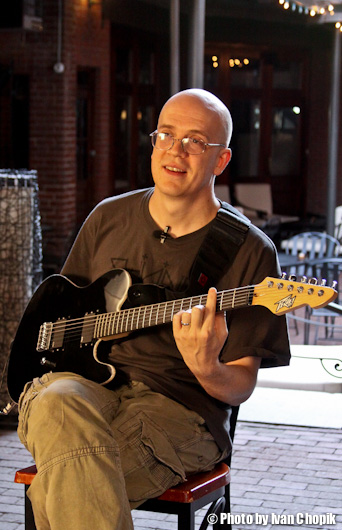 I guess what I was trying do with Addicted is once we’re born, we finally watch kids grow and people get older and we get further and further from that source. As we do it’s like our personalities become less and less about what the true nature is and we become more products of all our addictions. Not even addictions but the things that we think define us, like our cars or our guitars or our fancy amps or girlfriends or sex or drugs or rock ‘n roll or whatever. And then all of a sudden we become that. All of us become like, ‘that’s what we are.’
I guess what I was trying do with Addicted is once we’re born, we finally watch kids grow and people get older and we get further and further from that source. As we do it’s like our personalities become less and less about what the true nature is and we become more products of all our addictions. Not even addictions but the things that we think define us, like our cars or our guitars or our fancy amps or girlfriends or sex or drugs or rock ‘n roll or whatever. And then all of a sudden we become that. All of us become like, ‘that’s what we are.’
The whole thing with Deconstruction is I’m getting towards forty and it’s just like ‘well, what’s the meaning of all this? Why are we here?’ On some level I think there’s this sort of arrogance with humanity that we’re able to understand, and if not understand then there is this sense that in order to enjoy it, we have to control it. So Deconstruction is really a record about that. It’s like the character is trying to control this uncontrollable chaos of life and so it’s this stream of conscious that goes in a ton of different directions. It’s supposed to be this philosophical, religious quest that’s constantly being trumped by the fact that we’re douche bags. We’re all into childhood things, the addictions and the ghosts of that. So the record goes from really serious to really puerile to really adolescent to really complicated, a lot of things cresting in the song ‘Deconstruction’ which is the 2nd or 3rd to last song. At that point the character is supposed to be presented with what he’s assuming he’s been looking for and it’s something absurd. It’s a cheeseburger.
The whole point of it being a cheeseburger is ‘if you stare at something, or if you are too concerned about the reality of things, you miss the point that maybe what you’ve been looking at and focusing on isn’t of any importance anyway.’ And so the record ends with the character having confronted his fear and recognizing that if he’s held accountable for his actions then there really is nothing to be afraid of, because it’s not like he’s going to trump himself. So at the end of Deconstruction you’re left with the character saying ‘now that I know this, what am I going to do? Do I kill it? Now that I know that everything is futile, that it’s an illusion, what do I do? Do I just say “fuck everything” and let it go?’
That’s why Ghost comes, because then the choice is, ‘yeah, we’ve already jumped into the volcano and we’re heading towards dying so how do we choose to spend the rest of our time?’ In Ghost the character is like, ‘well, let’s just do something that’s pretty. Let’s have a good time. Let’s go hang out with our family. Let’s not think too much about it, and there it goes.’ And at the end of Ghost it loops back into Ki.
The idea of it being called Ghost is with the awareness, I guess, that the quest the character made was just like spinning wheels. He still is. He has to marry his past. He has to forgive himself. Philosophically it’s a real typical Paradise Lost kind of thing. Gwar did it a couple years before I did it. But I’m not sure what to say other I found that theme really interesting at the time. I like those kinds of stories. It’s like Star Wars or whatever. It’s the same shit. But I guess more than that, I’m trying to make sure that the records don’t come across as being some sort of pretentious mess and more ‘hey, it’s four different records that I think are individually really cool.’
EB: You can take it at either level.
DT: Yeah, or just don’t take it at all. That’s fine too. [laughs…]
EB: Do you see that evolving into anything for your future albums or are you just going to try to go somewhere completely different?
DT: I have no idea yet. I’ve got a bunch of ideas that are currently all kind of struggling to take precedence in terms of what the next record’s going to be. When something really engaging hits me, then I go for it, and that’s always been the case with me. So far I got a bunch of options but I’m waiting for the one to be like ‘okay, well there is where we’re going next.’ But I’ve got four options right now and each one of them has the potential of being really interesting, to me at least.
EB: The production on these albums is extremely good and Deconstruction especially is a very dense album. How did you develop your ear for production and mixing?

DT: Fucking up a lot of records, for other people and myself. Failure is a great motivator, especially when it’s public. [laughs…] But I think it’s good – I think if you’re not afraid to fail then eventually you’ll get it right.
EB: Was there any specific point when you really got your mixing chops to where you wanted them to be?
DT: I opened a studio in Vancouver three, four years ago when I was doing all the writing and I produced a whole slew of bands. None the bands I worked with had money really, so I mixed them all [in place of hiring an outside mix engineer]. Then I just started getting better and better and I managed to invest in a better rig and the sonic elements started coming together. Just trial and error, right?
EB: I know you’re a fan of multi-tracking.
I’ll always have that multi-tracked element to certain elements of my work from here on out, but I really look forward to doing a bunch more live-off-the-floor things. A bunch of Ghost was live off the floor and I enjoyed that, because I kind of like swinging in the wind, you know? Again, the failure thing I think is really cool. That’s what’s cool about improvising too: if you fail, you’re going to fail hard but if you win, you’re on point.
EB: For these four albums you were looking to use different musicians for each one. Can you talk a little bit about who you used for Deconstruction and Ghost and why you decided to work with those people?
DT: For Deconstruction, the core of it was I guess me, Dirk [Verbueren], and Ryan [Van Poederooyen]. For some records, the most important elements are the sequencing or a special bass player or whatever. But for the most part as a guitar player, the drummer is who I can bounce things off of the most, so choosing drummers has always been an exciting part of making a record for me. With Deconstruction, the obvious choice would’ve been Gene Hoglan, right? But the problem with that is because Strapping Young Lad no longer exists, I didn’t want to give people [the wrong idea]. A lot of people were just like ‘okay, well, who would you use?’ And so I thought, ‘well, I want to use people who have the personality that is similar to what the record is trying to put across.’
I’ve known Dirk for a while. He’s in Soilwork and Aborted and a bunch of stuff and he’s just a real sweetheart. He is 85 pounds soaking wet, he’s got a good sense of humor, likes the same sort of music I do, and he’s really, really good at improvising, you know? A lot of times when I work with drummers, we bash it out and it’s the same every time. There’s really something to be said for that, but with Dirk I’ll be playing a riff and all of a sudden he’ll be playing drums and it’s really exciting for me not to have to explain my ideas to people, because a lot of times drummers will get confused by how I write.
They’ll be like, ‘well, what are you doing?’ I’m like, ‘I have no idea!’ But with Dirk he’d be like, ‘oh yeah, I have no idea, but it is like that.’ So it’s a lot of fun to work with him. We had a lot of laughs because he is fun and lighthearted. Here is a guy that could do the real grinding, blasty sort of stuff without sort of the baggage of the whole über-serious death or black metal thing, which I do appreciate, but I didn’t want for this record.
For the really hammer-it-home sort of stuff I used Ryan, because he’s my live drummer. I’ve been working with him for about nine years and he has gotten to be fantastic. He’s just constantly blowing me away, because not only has he learned a bunch of Dirk’s stuff for this recent tour, but his consistency is phenomenal. The guy’s just like a machine and he’s in shape, too. When he plays it’s like a powerhouse and I don’t have to think about it. We’re both into this sort of weird-ass music that I do and we’re all trying to make a living. [Money] is always tight, so I wanted to include him when I did it live. He blew me away, because not only did he come in and play the stuff way better and way more proficiently than I had given him credit for, but consistently, too.
I don’t know what it is about consistency but I find that, specifically in a live format, it’s one of the most if not THE most important traits of a drummer and I’ve never had a more consistent drummer than Ryan. He knocked it out of the park. You listen to ‘Planet of the Apes,’ for example, and there are elements of that that I never expected him to do. So [him and Dirk] together really comprise a great sonic overview, and because they’re both such pleasant people to be around, there is no drama.
Other than that, on Deconstruction I had a ton of friends do guest vocals and everything. I’ve tried to avoid making a big deal about that, because I think it’s easy for those people to become this cheesy selling point for the record, as opposed to a texture for something that I was trying to make theatrical and it required voices different than mine. That being said, all of them are in bands that I like. I’m a big fan of them and it’s a real honor to have them.
EB: Of the four albums, why did you decide to have all those guests on Deconstruction?
DT: Deconstruction is supposed to be that exorcism, that facing of the fear of metal that I had for so long, and I think that when you go into your fear of anything artistically, if you do it half-assed, then you are never going to conclude it. So I was like ‘not only are we going to face this but we’re going put an orchestra on it, along with a choir and every singer that I like, and we’re going to mix it with Jens [Bogren], and we’ll do it for real!’ And then no matter what the statement is (because I rarely know what the statement’s gonna be until it’s done), it’s going to be framed in such a way that it’s like ‘there’s the statement!’
EB: As you mentioned, money has been a tough thing to deal with in the metal industry. How’s that been for you?
DT: In Vancouver there’s this scene: Nickelback, Theory Of A Deadman, and a bunch of bands that have made obscene amounts of money. To be perfectly honest, they’re good bands and there’s no ill will. You can say what you want about any of these bands, but they do what they do well; it sounds good and they’ve got a great show. That sort of music sells and it’s as simple as that. When those guys wake up in the morning, that’s the type of music they write. More power to them, right? Apparently when I wake up I decide to write convoluted concepts about cheeseburgers and the market for that is slightly smaller.
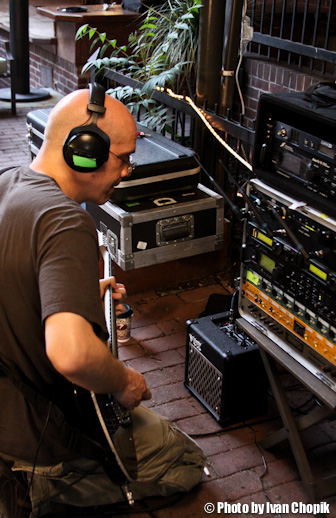
But you know, I really enjoy what I do and I think in this day and age where the industry has changed to the point where you have to be conscious of the people who support you, of your motivations, your family, mortgages and all this sort of stuff, I think the fight to continue to make music that is left-of-center has its own rewards. I’ve got a lot of support from Peavey, Fractal, Planet Waves, Sadowsky, and a bunch of companies that are just like ‘hey, we get it. It’s cool. You’re maybe not ripping up the charts, but you’re doing something that is important to you and important to certain people that listen to you.’
So I think that the bottom line is that I’m happy. Is money tight for this type of music? Oh yeah, totally. We’re losing a ton of money on this tour, but I got to stop there because I don’t want it to sound like I’m complaining about it as much as it’s a fact. When we went and got Prague’s Philharmonic Orchestra, my wife and I paid for that. With getting drummers, a lot of it is goodwill, and goodwill also extends to the people who support it. People ask me constantly, ‘what do you think about downloading?’ I’m like, ‘download everything I do! Please!’
The end of it is that I really want people to hear it, more so than because I’m doing this for some sort of job security. However, the bottom line is that it’s my source of income, so if the money stream is dried up, I can’t do it. I’m not going to let my family starve, so I’ll go work at a job if I have to.
EB: I feel like your longtime fans all want to support you.
DT: And that is the exact point [about the effect of downloading]. I think it’s affected the industry in general, but the people who have supported what I do are absurdly generous, you know? They’ll buy the special edition. They’ll buy shirts that we sell online. My opinion of the stuff that we sell is we try and make it the best we can. In a lot of ways it’s a gesture that the fan base offers in order to signify that they want to keep going. So we make it work and it’s really cool.
EB: Obviously these last few albums have been a different process considering you getting clean a few years ago. Do you think if you could go back you would’ve spent your whole career in your current lifestyle or do you think it was a necessary process?
DT: No way. I would never change anything about the past. I don’t even think it’s worth thinking about in all honesty. No man, everything I’ve done has led me to where I am and I’m happy. Yeah, I had a great time, dude. When I was drinking and partying, I had a great time.
EB: So it’s just where you need to be in the present moment.
DT: I guess. I mean, it’s where I have to be more so than need to be, right? [laughs…]
EB: Could you possibly just tell me anything you haven’t told anyone else in an interview before?
DT: I got one ball that’s bigger than the other.
EB: All right, there we go! On a little more serious note…

DT: That’s pretty serious.
EB: It is pretty serious, just as long as everything’s okay.
DT: Okay, what haven’t I told anybody else? Uhh, I’m thinking about jam right now.
EB: What kind?
DT: Strawberry.
EB: That’s my favorite.
DT: Really?
EB: Yeah, totally.
DT: Nice, let’s get some crumpets and rock that shit.
EB: Yeah!
DT: I got nothing really to say. I think that’s the biggest defining thing about what I do, man. It’s like everything’s a hypothesis. Like some people are just like ‘what did you mean by that?’ or ‘why did you say this?’ and I’m like ‘I have no idea!’ Someone came up to me yesterday asking, ‘what were you trying to say with this?’ about a song on Ghost and I’m like, ‘I’m on autopilot, man. I was watching a movie while I was writing that song!’ You know what I mean? [laughs…]
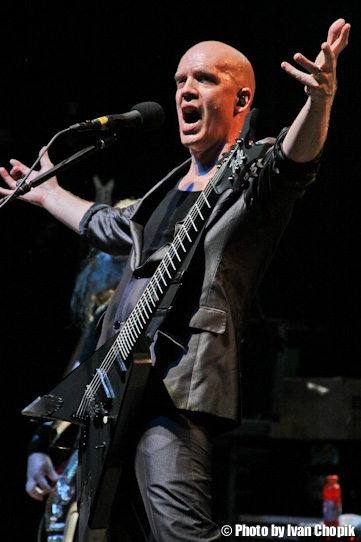
EB: That kind of goes along with what you’re saying about Deconstruction, kind of the accepting of the unknown.
DT: Yeah. There’s a philosopher, Carl Jung, and I don’t know enough about him to sound like an authority, but sort of an armchair observation of him: he’s got this whole idea of the collective unconscious where, and I may be wrong here, but from what I understand it’s like creativity is a pool of human intellect and experience that music is just a part of. It’s not like any of us write music – it’s just there.
I think that as artists we are like workers: we just grab [music] according to how our life experience has led us to this point where we are privy to that melody or the sound or this idea. I don’t know what the hell most of it’s about, but it really resonates with me and I definitely don’t think it’s mine or yours or anybody’s. It’s just what it is. Music.
EB: The love for that melody or that sound is enough.
DT: Totally. And when I’m writing lyrics it’s always phonetic too. Like I know for that riff, the [corresponding lyric] starts with B and ends with an S and then it goes to this high note, and then eventually it just turns into words, right? Sometimes they make sense and sometimes they don’t, but I think your subconscious mind directs that. You’re not channeling anything, I don’t believe in that, but I think your subconscious mind eventually just [knows what] you want to say: starts with a B, ends with an S? You wanted to say ‘bananas!’ or whatever. [laughs…] And eventually you’re like ‘ahh, I guess that line says bananas on that riff.’
EB: Considering that you’ve had such extensive experience in the music industry, the metal industry, is there any sort of advice that you could give to young, aspiring musicians?
DT: Play from your heart or I guess don’t play at all. Unless, of course, you’re able to write pop music and then write as much of it as you can and buy your folks a house. I don’t know. I think all the age-old inspirational quotes actually apply: ‘if you fall, get back up!’ ‘Don’t shit where you eat!’ [laughs…] All those things make sense. I mean it’s like any job, man. If you can’t handle failure then I don’t think success is an option, so maybe just learn to fail efficiently and keep going.
[Special Thanks Chris Thomas and Joe Mahoney for their excellent camera work and Devin Kumar for his fantastic video intro and editing!]



